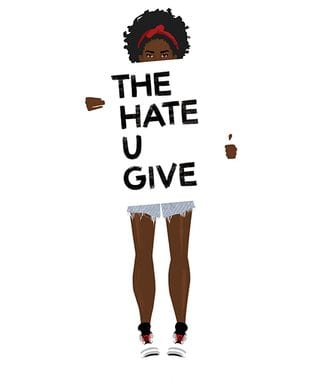
This review is exclusively the opinion of the author and not a representation of the newspaper.
The Hate U Give by Angie Thomas is an important book in a time of uproar against the issues of police brutality and race relations in America.
It presents the story of a 16-year-old girl named Starr, who witnesses the shooting of her childhood friend, Khalil, at the hands of a police officer. Khalil was unarmed and the shooting fatal.
Soon afterwards, his death becomes a national headline. Some try to justify the murder by labelling him a thug, drug dealer, or gangbanger. Throughout the novel, Starr goes through an internal battle of when to speak up and when to keep quiet about these allegations as it could endanger her and her family’s life.
This novel emphasizes how detrimental assumptions and stereotypes can be and the importance of using your voice to spark change. It argues that drug and prison systems force the lower class into a never-ending cycle, while the media unabashedly warps our perception of the truth. It explains that racism can be both intentional and unintentional. Most importantly, it is at all times destructive.
With that being said, here is a list of my personal responses to the ideas presented in the book:
1. Starr’s friend Hailey is relatively ignorant and insensitive to racial issues, having lived in a predominantly white, upper-class neighbourhood all her life. The protagonist reacts to her lack of awareness by criticizing and attacking her, rather than educating her on how detrimental preconceived notions against any race can be. Although it’s understandable why the protagonist feels that way, from my experience, I feel that it would be more productive to educate people rather than getting angry at them.
2. In the story, the police officer voices his desire to make a difference for the better in Starr’s neighbourhood. She responds by saying:
“Funny, slave masters thought that they were making a difference in black people’s lives too. Saving them from their ‘wild African ways.’ Same sh*t, different country. I wish people like them would stop thinking that people like me needed saving”
I believe the narrator needs to realise the reality of the situation, which is that without government intervention, systematic oppression and prison cycles that cause so many to suffer will never end. Without things like financial aid and a better education system, the community will continue to endure economic, social and political difficulty. From history, it is evident that it’s not possible for a marginalised group to make progress towards equality if the oppressors don’t make an effort too.
3. Throughout the novel, Starr continuously overly victimises herself and uses racial differences as a way of not dealing with her feelings.
When having an argument with her boyfriend, she says:
“You’re white, okay?” I yell. “You’re white!”
Silence.
“I’m white?” he says, like he’s just hearing that for the first time. “What the f*ck’s that got to do with anything?”
“Everything! You’re white, I’m black. You’re rich, I’m not.”
I felt like her boyfriend didn’t deserve the way that he was treated since he consciously made an effort to be supportive and understanding throughout the hard times. I felt like she victimised herself, instead of dealing with the root cause of her anger. While some of that did genuinely come from racism, a lot of it did not. This made her more likely to lash out at the people she loves. The protagonist, I felt, should have looked inside herself first and tried to understand the intersectionality of things before jumping to conclusions.
Overall, I think The Hate U Give started a conversation that needed to happen. The concept has never been as relevant as it is now since it focused on a police shooting. However, the idea and the execution are two different things. While I found the concept intriguing, the way that the novel was presented could have been done better. I thought Angie Thomas could have focused more on the actual shooting – someone being in the wrong place at the wrong time – and not on the race war for such a huge part of it.
Furthermore, because of the language used and the lack of explanation concerning racial issues I felt that the book has the potential of creating a bigger divide between the races. It villainises the white man, which although justified, doesn’t explain the problem and a way you can fix it. For white readers, this could mean that they are less likely to see the cause for what it is – a desire to end systematic oppression – and see it more as a crusade against them.
Despite this, The Hate U Give is still an important read and I’m sure that it will be up for more debate once the film starring Amandla Stenberg comes out.
If you are a member of Book Club or have an opinion on the book, feel free to comment below
